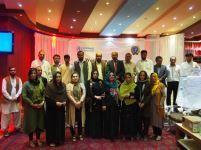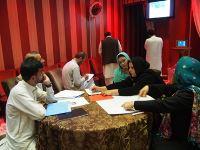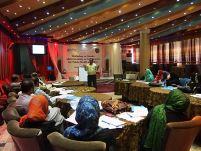 Kabul 5 June 2014 - WHO Afghanistan office, together with the Ministry of Public Health, facilitated a training for health care providers on gender mainstreaming in emergencies this week. Twenty-one health care professionals from Paktia province attended the training, including nurses, midwives, psychologists, doctors and vaccinators.
Kabul 5 June 2014 - WHO Afghanistan office, together with the Ministry of Public Health, facilitated a training for health care providers on gender mainstreaming in emergencies this week. Twenty-one health care professionals from Paktia province attended the training, including nurses, midwives, psychologists, doctors and vaccinators.
“When I first conducted gender training for health care workers from Paktia in 2005, there was a lot of resistance and people wouldn’t accept ideas about gender equality or the importance of gender in health care,” says trainer Dr Sharifullah Haqmal, WHO Afghanistan. “It’s good to see the positive change now: people are more open to these ideas and they really see the value of learning about gender mainstreaming in health work.”
The four-day training covered key gender topics for health professionals and focused on health care response in emergency situations. Gender-based violence (GBV) was discussed in detail in the training, focusing on the different types of GBV, signs and symptoms of GBV and administering care to GBV survivors. The End Violence against Women (EVAW) law was also discussed, and a module on gender and Islam discussed equal rights from a religious perspective. The participants were also familiarized with practical tools to conduct gender analysis and gender mainstreaming in their everyday work and in emergency response.
“This training is crucial in the Afghan context. One of the government’s strategies focuses on recruiting more women in the health sector, the figure should be at least 30% and we are not there yet. As the training sensitizes health care workers on gender issues, it also helps us achieve the Ministry’s objectives,” says Dr Najla Areeb, Trainer and Gender Officer at the Ministry of Public Health.
“This training topic was very new to me,” says one of the participants, a female nurse from Sayid Karam district of Paktia. “I have not learned about gender and women’s rights in health care before. When I go back to my clinic I want to apply the skills I have learned and also teach others,” she says. “There are a lot of bad cultural issues that need to be addressed, such as baad (the selling of women and girls to settle disputes or debt), and the poor nutrition of pregnant and breastfeeding women,” she adds.
The focus of the training was on disasters and emergency response. Women and men experience disasters in different ways, mainly due to the socially determined roles of men and women and women’s lack of access to resources and weak decision-making power. There are gender differences at all levels of the disaster process, including exposure to risk, preparedness, response, physical and psychological impact as well as recovery and reconstruction. The training focused on women’s specific needs in emergency situations and introduced gender-sensitive checklists for relief supplies.
“The issues we are dealing with in this training are very sensitive, talking about women and men’s rights, but we need this training,” says male doctor and hospital director from Gardez. “My plan is to go back to Paktia and organize a training for my colleagues on the issue and train community health workers. We can’t just leave it at that, we also need to apply these principles of equality in our family lives.”
 |
 |



